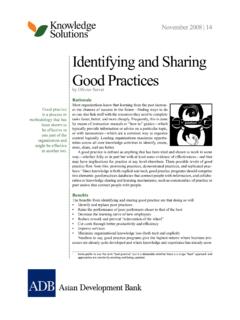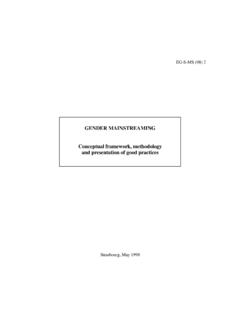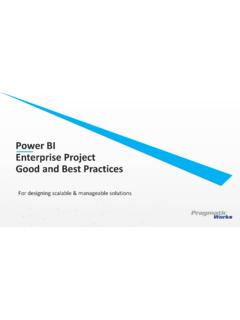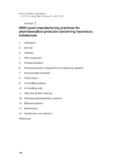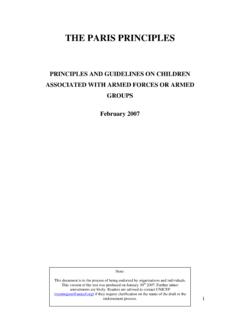Transcription of Good Records Management Practices - GRS
1 GGGOOOOOODDD RRREEECCCOOORRRDDDSSS MMMAAANNNAAAGGGEEEMMMEEENNNTTT PPPRRRAAACCCTTTIIICCCEEESSS GOVERNMENT Records SERVICE OCTOBER 2011 BLANK PAGE TABLE OF CONTENTS FOREWORD 1 Chapter 1 OVERVIEW OF Records Management 2 Chapter 2 Records Management POLICY 5 Chapter 3 RECORDKEEPING SYSTEMS 8 Chapter 4 Records Management PROCESSES AND CONTROLS 10 Chapter 5 PROTECTING VITAL Records 22 Chapter 6 MONITORING AND AUDITING 24 Chapter 7 TRAINING 25 Chapter 8 ELECTRONIC Records Management 26 Annex I Checklist for Proper Records Management Practices 31 Annex II Management of Archival Records 38 Annex III Guidelines on Preservation of Archival Records 42 Annex IV Guidelines on Establishing a Vital Records Protection Programme 52 Annex V References 55 BLANK PAGE 1 FOREWORD Records are valuable assets of organizations.
2 good Records Management not only helps protect Records but also enhances organizations operational efficiency. Recognizing the importance of good Records Management and of preserving Hong Kong s documentary heritage, the Government of the Hong Kong Special Administrative Region (the Government) has developed its Records Management policy and procedures with regard to international standard ( ISO 15489 Information and documentation - Records Management published by the International Organization for Standardization in 2001) and international best Practices .
3 2. Records Management is an important function of an organization. We believe that good and proper recordkeeping is evidence of a well-governed organization and should be seen as an integral part of, rather than incidental to, any business. In terms of strengthening corporate governance and promoting good Management Practices , we see definite merits of sharing good Records Management Practices and procedures with government-owned or funded statutory bodies. 3. By setting out the principles and good Practices relating to Records Management , and providing checklist and guidelines, this document aims to help government-owned or funded statutory bodies and their staff to assess the way in which they are managing their Records and to pursue improvements if necessary.
4 FOREWORD good Records Management Practices 2 1. OVERVIEW OF Records Management WHAT ARE Records ? An organization receives and processes tremendous amount of information day in and day out but not all of them are Records . A record is invariably linked to an organization s official business and maintained as evidence. Accordingly, Records can be defined as any recorded information or data in any physical format or media created or received by an organization during its course of official business and kept as evidence of polices, decisions, procedures, functions, activities and transactions.
5 For example, a driving licence application will be kept as a record by the Transport Department of the Government as evidence of its business. Content, context and structure of a record In order to serve as evidence, a record should be complete and must possess the following three elements - Content this refers to the information or ideas the record contains; Context this refers to the information about the circumstances in which the record is created, transmitted, maintained and used ( who created it, when, to whom it was sent, why).
6 And Structure this means the physical and logical format of the record, and the way parts of the record relate to each other ( the structure of an e-mail record covers its header, body, attachments and corresponding reply). WHAT IS Records Management ? Records Management refers to the whole range of activities which an organization should perform to properly manage its Records . The key activities include setting Records Management policy, assigning responsibilities, establishing and promulgating procedures and guidelines, as well as designing, implementing and administering recordkeeping systems.
7 CHAPTER 1 OVERVIEW OF Records Management good Records Management Practices 3 In the Government, Records Management includes the planning, directing, organizing, controlling, reviewing, training and other managerial activities involved with respect to the creation, classification and indexing, distribution, handling, use, tracking, storage, retrieval, protection and disposal of Records to achieve adequate and proper documentation of government policies, decisions and transactions as well as efficient and cost-effective operation of government bureaux and departments (B/Ds).
8 All organizations need to identify the regulatory environment that affects their Records Management . The regulatory environment may comprise such elements as laws and regulations, codes of best Practices , code of conduct etc. For instance, the retention period of a particular type of Records before they can be destroyed may be governed by a law or a code of practice. Regulatory environment Some laws and codes may have implications on Records Management of an organization, for example - Evidence Ordinance (Cap. 8) - proper keeping of Records to ensure its legal admissibility; Personal Data (Privacy) Ordinance ( ) - timely destruction of personal data in accordance with Privacy Commissioner Office s Code of Practice on Human Resource Management ; Limitation Ordinance ( ) - retention of relevant Records for the specified limitation periods to serve as evidence in possible legal proceedings; Electronic Transactions Ordinance ( ) - admissibility of electronic Records in a court of law.
9 And Code on Access to Information - proper organization of Records to facilitate their efficient retrieval to timely respond to public access requests. good Records Management Practices CHAPTER 1 OVERVIEW OF Records Management 4 WHY IS Records Management IMPORTANT? Records Management is important because it supports an organization to - make decisions based on evidence; meet operational, legal and regulatory requirements; be open and accountable; enhance operational efficiency and effectiveness; and maintain organization or collective memory.
10 A comprehensive checklist to assess whether an organization has put suitable arrangements in place to manage its Records is at Annex I. good Records Management Practices CHAPTER 1 OVERVIEW OF Records Management 5 2. Records Management POLICY OBJECTIVE OF Records Management POLICY good Records Management starts with a policy which reflects an organization s needs. The objective of the policy should be the creation and Management of authentic, reliable, complete and usable Records which are capable of supporting business functions and activities of the organization for as long as they are required.

